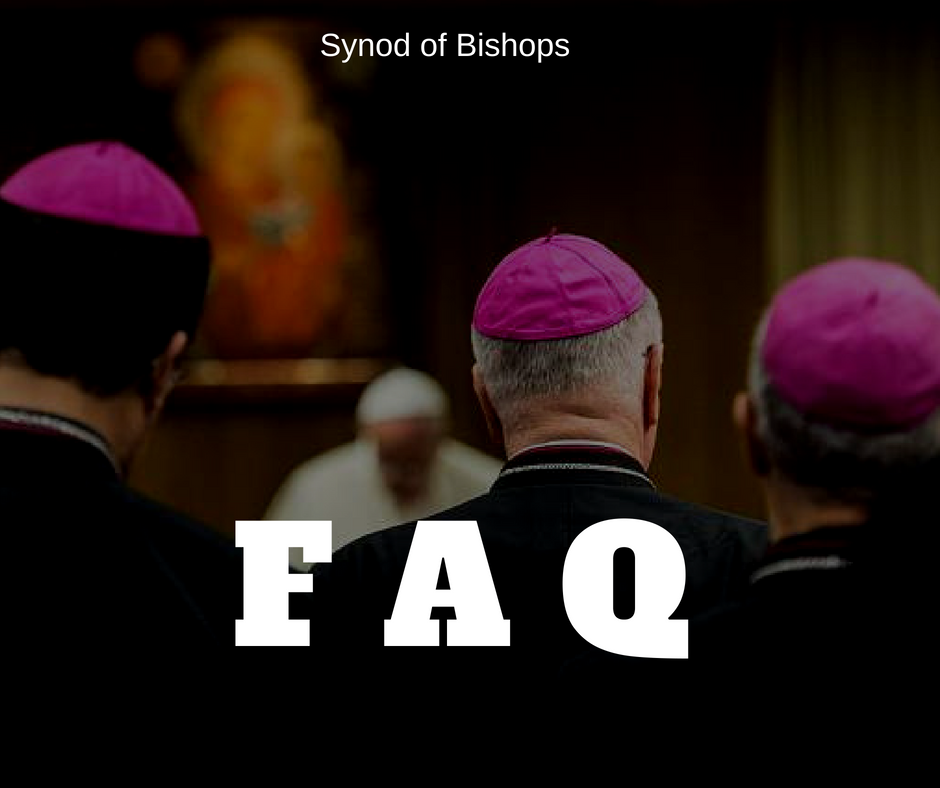Frequently Asked Questions On The Synod of Bishops

Frequently Asked Questions On The Synod
What is the Synod of Bishops?
The Synod of Bishops was created by Saint Paul VI on the 15th September 1965 with the Motu Proprio Apostolica Sollicitudo.
On the 8th December 1966 the Ordo Synodi Episcoporum celebrandae and on the 20th August 1971 the Ordo Synodi Episcoporum celebrandae recognitus et auctus were respectively promulgated, whereas a revised edition of the Synodi Episcoporum was published on the 6th October 2006.
The synod of bishops is a group of bishops who have been chosen from different regions of the world and meet together at fixed times to foster closer unity between the Roman Pontiff and bishops, to assist the Roman Pontiff with their counsel in the preservation and growth of faith and morals and in the observance and strengthening of ecclesiastical discipline, and to consider questions pertaining to the activity of the Church in the world (can. 342).
It is for the synod of bishops to discuss the questions for consideration and express its wishes but not to resolve them or issue decrees about them unless in certain cases the Roman Pontiff has endowed it with deliberative power, in which case he ratifies the decisions of the synod (can. 343).
The synod of bishops can be assembled in a general session, that is, one which treats matters that directly pertain to the good of the universal Church; such a session is either ordinary or extraordinary. It can also be assembled in a special session, namely, one which considers affairs that directly pertain to a determinate region or regions (can. 345).
The Synod of Bishops was gathered in its First General Assembly from the 29th September to the 29th October 1967.
On the 23rd March 1970, Blessed Paul VI accepted the vote expressed by the First Extraordinary Assembly, which took place from the 11th October to the 28th October 1969, and decreed the Constitution of the Consilium Secretariae Generalis Synodi Episcoporum. This was composed of 15 Members of which 12 elected by the Synodal Assembly and 3 nominated directly by the Holy Father. The mandate entrusted to them lasts for the period of time that passes between one and the next General Assembly (can 348 §1).
Following the Special Assemblies, Councils which refer to each of them have also been established.
Source: Annuario Pontificio 2017
(P.S. On the 15th September 2018 Pope Francis signed the Apostolic Constitution Episcopalis communion on the Synod of Bishops).
Documents about the Synod on Youth
Final Document of the Pre-Synodal Reunion
Social Networks for #Synod2018
We reccomend using hashtag #Synod2018
Facebook: https://www.facebook.com/synod2018/
Twitter: https://twitter.com/synod2018
Instagram: https://www.instagram.com/synod2018/
WhatsApp: +39 342 601 5596 (messages only)
Journalistic Coverage
During the course of the Synod there will be press conferences and daily press briefings. These will take place in the Press Office of the Holy See, which is situated in Via della Conciliazione, 54.
Any journalist who intends to participate in the press conferences and/or interviews must be accredited by the Press Office of the Holy See.
If you are a journalist or media operator please visit the link below for information on how to become accredited by the Press Office of the Holy See:
http://press.vatican.va/content/salastampa/it/accrediti/pubblico/accredito.html
If any journalist would like to interview a Synodal Father or any other participant in the Synod he is free to do so by making private arrangements directly with the proposed interviewee.
The accredited journalist may also send an e-mail with an interview request to sinodo@salastampa.va addressed directly to the Synodal Father in question or other Synodal participant. The Secretariat of the Synod will then ensure that the request for the interview goes to the intended recipient. It will then be the responsibility of the proposed interviewee to reply if they are able to and if they are available for interview to then make suitable arrangements for the personal interview outside the Paul VI Hall.
How the Synod Works
The work of the Synod takes place in sessions in which all the Synodal Fathers participate in the Synod Hall. These are called general Congregations and are begun with a report called “ante disceptationem”, which is prepared by the overall Synodal Chairman.
There are three main phases:
(a). During the first phase every member presents the situation of their own particular Church to the other members. This rich exchange of experiences of faith and culture centered around the theme of the Synod helps to form an initial picture of the situation of the Church. This picture however, will subsequently need to be deepened and perfected.
(b). In the light of these different presentations, the Synodal Chairman draws up a series of issues that emerge from them (these are gathered in a report called “post disceptationem”) and are then debated during the second phase when all the members of the Synod are split into different language groups called Minor Circles (circuli minores). The findings of each group are subsequently read during the plenary assemblies. During this time the Synodal Fathers can ask for further clarification on the themes that are presented and provide their own comments.
(c). In the third phase the Circles dedicate themselves to formulating clear and well defined suggestions and observations so that in the final days the assembly can proceed to voting for concrete propositions. The initial work of the Synodal Fathers, gathered in the Circles, leads to the formulation of different concrete proposals based on the discussions in the Synodal Hall and on the reports of the Circles. In the Circles, the Synodal Fathers can vote on a proposition with either a “placet” (I approve) or “non placet” (I do not approve). The propositions that emerge from the Circles are then submitted to the Synodal Chairman and to the Special Secretary and are then collected in a single list. This list of all the propositions is then presented to the Synodal Chairman in the plenary sessions. Following this, the Synodal Fathers can submit their individual amendments in their own Circle.
All the votes from the different Circles as well as the ones concerning the amendments to the propositions will then be collected. The Synodal Chairman and the Special Secretary will give their opinions on these collective amendments and will decide on whether to include these in the final list of propositions, if they decide to reject these they have to explain their motivations in a document called: Examination of Amendments.
The final list of the propositions can then be presented in the plenary sessions and submitted to be voted on by each Synodal Father who can decide in favour or against each proposition.
At the close of the General Assembly of a Synod, the Secretary General archives all the material in the General Secretariat and compiles the final report to submit it for the attention of the Holy Father.
(source: Vatican Radio 2008).
List of all the Synodal Assemblies
Ordinary General Assemblies
- 2018 - XV Ordinary General Assembly. Young People, the Faith and Vocational Discernment
- 2015 – XIV Ordinary General Assembly. The Vocation And Mission Of The Family In The Church And The Contemporary World
- 2012 – XIII Ordinary General Assembly. The New Evangelization for the Transmission of the Christian Faith
- 2008 – XII Ordinary General Assembly. The Word of God in the Life and the Mission of the Church
- 2005 – XI Ordinary General Assembly. The Eucharist: Source and Summit of the Life and Mission of the Church
- 2001 – X Ordinary General Assembly. The Bishop: Servant of the Gospel of Jesus Christ for the Hope of the World
- 1994 – IX Ordinary General Assembly. The Consecrated Life and Its Role in the Church and in the World
- 1990 - VIII Ordinary General Assembly. The Formation of Priests in Circumstances of the Present Day
- 1987 - VII Ordinary General Assembly. The Vocation and Mission of the Lay Faithful in the Church and in the World
- 1983 - VI Ordinary General Assembly. Penance and Reconciliation in the Mission of the Church
- 1980 - V Ordinary General Assembly. The Christian Family
- 1977 - IV Ordinary General Assembly. Catechesis in our Time
- 1974 - III Ordinary General Assembly. Evangelization in the Modern World
- 1971 - II Ordinary General Assembly. The Ministerial Priesthood and Justice in the World
- 1967 – I Ordinary General Assembly. Preservation and strengthening of the Catholic faith, its integrity, its force, its development, its doctrinal and historical coherence
Special Assemblies
- 2019 – Special Assembly for the Amazon. Amazonia: New Paths for the Church and for an Integral Ecology
- 2010 - Special Assembly for the Middle East - The Catholic Church in the Middle East: Communion and Witness
- 2009 - II Special Assembly for Africa. The Church in Africa at the Service of Reconciliation, Justice and Peace
- 1999 - II Special Assembly for Europe. Jesus Christ, Alive in His Church, Source of Hope for Europe
- 1998 - Special Assembly for Asia. Jesus Christ the Saviour and His Mission of Love and Service in Asia: ‘...That They May Have Life, and Have it Abundantly’
- 1998 - Special Assembly for Oceania. Jesus Christ and the Peoples of Oceania: Walking His Way, Telling His Truth, Living His Life"
- 1997 - Special Assembly for America. Encounter with the Living Jesus Christ: the Way to Conversion, Communion and Solidarity in America
- 1995 - Special Assembly for Lebanon. Christ is Our Hope: Renewed by His Spirit, in Solidarity We Bear Witness to His Love
- 1994 - I Special Assembly for Africa. The Church in Africa and Her Evangelizing Mission Towards the Year 2000: ‘You Shall Be My Witnesses’ (Acts 1:8)
- 1991 - Special Assembly for Europe. So that we might be witnesses of Christ who has set us free
- 1980 - Particular Synod for the Netherlands. The Pastoral Situation in the Netherlands
General Extraordinary Assemblies
- 2014 – III Extraordinary General Assembly. Pastoral Challenges of the Family in the Context of Evangelization
- 1985 – II Extraordinary General Assembly. The Twentieth Anniversary of the Conclusion of the Second Vatican Council
- 1969 - I Extraordinary General Assembly. Cooperation between the Holy See and the Episcopal Conferences
(source: Vatican.va)




